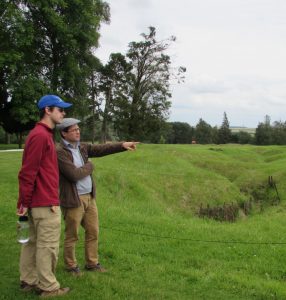By Kevin Lavery ’16
In September #TeamPeirs celebrated our two-year anniversary of going live. As anniversaries are a time for reflection, we thought we would contribute a few pieces on what #TheStaff has taken away from working on Peirs. As we are in the midst of a crowdfunding campaign to get us over to France in March 2018, we thought it might be of interest to our readers to know what its like to work on this project.
I first encountered Jack while serving as an associate editor for the Gettysburg Historical Journal. I had been assigned to read and edit a submitted paper about Jack’s leadership in the trenches. I knew the author, Marco Dracopoli, from a class we had taken the previous semester. It still came as a surprise, however, when I reached the end of the paper where Marco revealed that H. J. C. Peirs was his own great-grandfather. We accepted and published the paper. I thought no more of it for two years, when I was asked to join the Jack Peirs project as a student assistant. I accepted immediately.
My main responsibility was to annotate posts with links to outside resources. In the process, I discovered more about Jack’s use of language, his priorities, and his concerns. Through conversations with the team members, I learned the capabilities and limitations of the digital tools we were using, as well as ways to overcome those limits. These lessons proved their worth during my first full-time job, when I was tasked to oversee the development of an ambitious digital history project.

Kevin Lavery and Ian Isherwood examining the remains of communications trenches visible at the Newfoundland Memorial, Beaumont-Hamel France, 2016.
I also had the privilege of accompanying #TeamPeirs to England, France, and Belgium in the summer of 2016 for research and reconnaissance. This was my second college-sponsored trip to the battlefields of the First World War, and on this occasion Jack provided a helpful anchor in a story that can become intellectually and emotionally overwhelming when you find yourself among the somber cemeteries, peaceful fields, and jagged remnants of trenches that scar the countryside.
Our time in England was no less enriching. As a student, I had often visited Special Collections at Musselman Library and the Pennsylvania State Archives for classwork and personal projects, but researching in major archives like the UK National Archives and the Imperial War Museum afforded me new insights into the nitty-gritty work of a historian. Traveling to these archives, looking through obscure records, and trying to trace the life of one man caught up in a world war was ideal practice for my current work as a graduate student in European history.
Even aside from the business portion of the trip, our time in London was valuable and memorable. Exploring London’s streets and Underground prepared me well for the experience of living in New York City and left me with a sense of place that has been a considerable asset in my current class on the history of London. Above all, I will never forget the chilling experience of walking into Waterloo Station on the 100th anniversary of the Battle of the Somme and seeing actors dressed as British soldiers standing amid the bustle, silently passing out cards with the names of those who died on July 1, 1916.
I am grateful for the opportunity to have worked alongside and under the mentorship of the rest of the staff, and to have played my own small role in contributing to the First World War Letters of H. J. C. Peirs.
